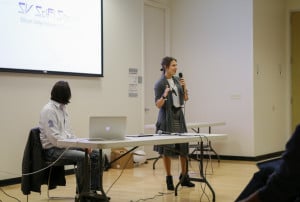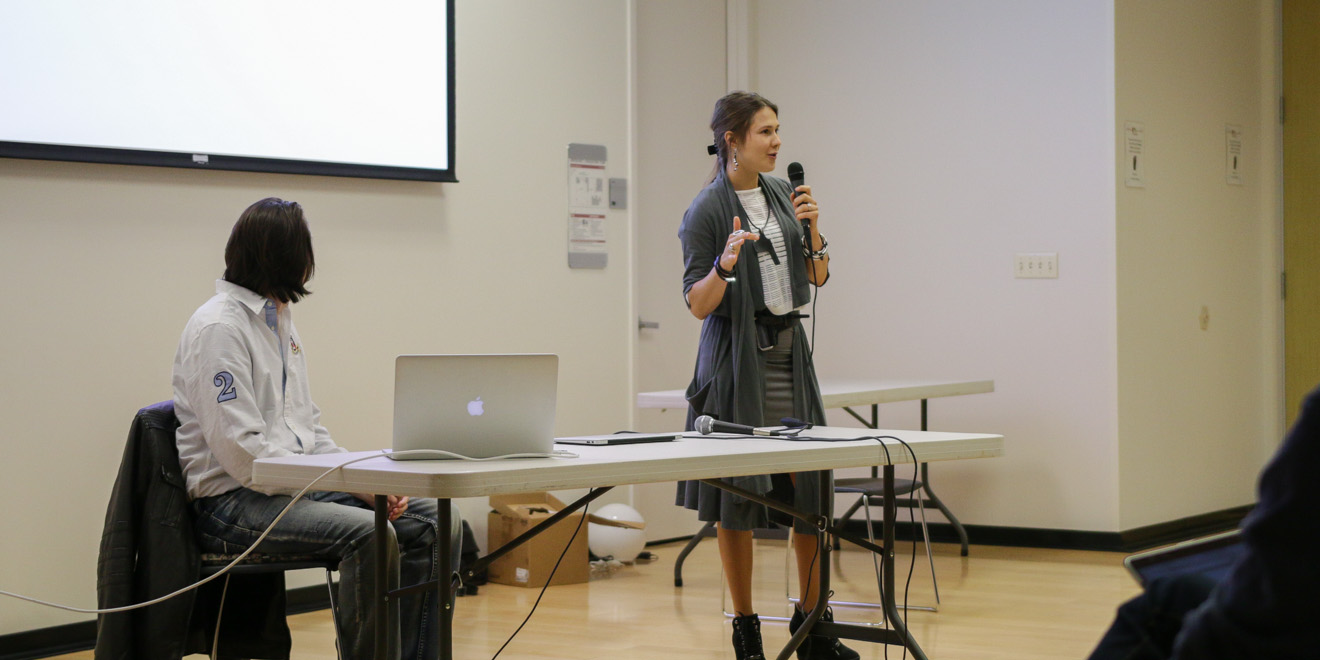At a talk on Saturday night that intertwined philosophy with technology, inventor and entrepreneur Adam M. Curry revealed the ideas behind the upcoming app Entangled, which allows people to explore and experiment with the nature of “collective consciousness” and reality. The event was hosted by the Graduate School of Business’ Big Ideas Club and the Silicon Valley Science Fiction Society.
Entangled is based off of the philosophical theory that human consciousness is distinct from cranial cellular matter. In other words, consciousness could exist everywhere, not just in the brain. It adopts the experimental design of the Global Consciousness Project (GCP), which purports that human consciousness can affect the behavior of random number generators (RNGs). According to the GCP’s website, RNGs based on quantum behavior should produce completely unpredictable sequences of zeroes and ones. But when a global event, such as 9/11, strongly affects the feelings of millions of people, their collective consciousness is able to produce a sequence of digits that deviates from standard RNG behavior.
“We have a conventional theory of the brain and the nature of reality where it’s impossible to [affect RNGs] … but what we find empirically is that there tends to be effects on the RNGs that we can’t explain in correlation to that person’s attention,” Curry said.
The free mobile app, to be released in the following months, will turn the hardware of a phone into a random number generator, according to Curry. It will operate in the background and send the generated random numbers to a cloud server, hopefully producing evidence that the consciousness of users affects their phones.
“We’re looking to see what are the parameters of our minds that can affect our phone. When and why and how?” Curry said. “And what are the parameters of collective consciousness or the effects that show up in everyone’s phone and data stream around a single event?”

Entangled also explains the theory of consciousness proposed by Christof Koch, a neurologist and chief scientific officer at the Allen Institute for Brain Science. In an interview with Wired magazine, Koch suggests that the entire universe and all matter are infused with sentience. However, it takes a complex, information-processing system such as the human brain to process that consciousness in the first-person perspective.
“A lot of people have their own theories,” Curry said. “I’m personally theory-agnostic, but I think it suggests that at some deep level, there’s a connection between the substance of our minds and the physical world.”
Among the approximately 200 guests at the talk, Cameron Cross, a San Francisco tech worker who considers the question of consciousness a hobby, attended the event to see whether Curry’s experiments would be beneficial or detrimental to people who already experience the inexplicable effects of consciousness.
“I’m a fan of technology, and I’m always conscious of making sure and checking in that the technology we’re making around these experiments are not to the detriment of being able to tap into our abilities without the technology,” Cross said. “[Curry] comes across as someone who experiences this, and, as a scientist, he wants to see how do you quantify that experience.”
Curry sees potential implications of the Entangled results for scientific research, on the grounds that the effects of consciousness on the physical world could affect the results of scientific experiments.
“If our minds can affect the world, then can we really do purely objective science in which the experimenters aren’t mucking up the results?” Curry said. “And I think the answer is yes. It’s more a question of to what degree is there uncertainty in the experiments that you’re setting up?”
While producing Entangled, Curry has experienced outspoken opposition from debunkers of collective consciousness. Interestingly, there appears to be a coastal divide in the responses he receives, according to Curry.
“What’s funny is that the east coast Ivy League people are not amused,” Curry said. “The west coast ‘Ivy League’ people love this stuff. It’s not just that they believe everything they hear, but I think they’re more optimistic than pessimistic. And I think they’re intrigued by the technological possibilities and the novelty of doing something like this.”
For many of the attendees, the topic of consciousness beyond the physical realm is nothing new as eastern philosophy has long suggested that consciousness is the default condition, according to Cross. But for others, the notion of Entangled strays into the unknown and maybe even science fiction.
As Curry said, “It’s possible, we might live in the Matrix.”
Contact Ariel Liu at aliu15 ‘at’ stanford.edu.
